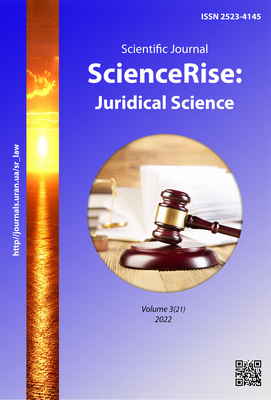Separate reasons for limiting the freedom of contract when choosing the type of transaction
DOI:
https://doi.org/10.15587/2523-4153.2022.265544Keywords:
freedom, contract, transaction, restrictions, public contract, accession contract, standard contract, preliminary contractAbstract
Separate reasons for limiting the freedom of contract when choosing the type of transaction have been studied. For this purpose, the author analyzed the concept and essence of limiting the freedom of contract at the stage of choosing the type of transaction, identified the grounds for limiting the freedom of contract when choosing the type of transaction, compared a number of transactions that, due to their legal nature, significantly limit the freedom of contract, in particular, we are talking about public contracts, contracts of accession, standard and preliminary contracts, as well as contracts with persons who won public bidding.
A comprehensive methodology was used to conduct the research, which combined: the historical method, which was used in the analysis of the transformation of legislative approaches to the regulation of freedom of contract; systemic for determining and clarifying the legal nature of the restriction of freedom of contract; the formal-legal method was used in the analysis of the texts of current domestic normative acts, court practice regarding the restriction of freedom of contract; with the help of legal hermeneutics, the content of normative legal acts, regulating the procedure for choosing the type of transaction was clarified; the forecasting method made it possible to develop proposals for the optimal normative-legal regulation of the restriction of freedom of contract; methods of critical analysis became the basis for clarifying the positions of scientists. This methodology made it possible to thoroughly study empirical data, the provisions of the current legislation of Ukraine, as well as the practice of Ukrainian courts.
The conducted research made it possible to reach and substantiate a number of conclusions. In particular, that contracts can be both public and accession ones, or only have signs of a public contract or an accession contract. At the same time, when concluding such contracts, the freedom of contract is significantly limited, both with regard to the possibility of the entrepreneur refusing to conclude a public contract, and with respect to the parties joining the accession contract or public contract, who are deprived of the opportunity to determine the terms of the contract. At the stage of concluding a public agreement and an accession agreement, only one of the parties has freedom of action regarding the conclusion.
It is substantiated, that the freedom of contract can be limited by a standard contract, which can be both recommended at the level of subordinate legal acts and developed by any participant in civil legal relations. When concluding a preliminary contract, the freedom of the parties is limited temporarily and partially
References
- Melnychenko, R. V. (2015). Limiting contractual freedom of the parties in the civil law of Ukraine. Naukovyi visnyk Uzhhorodskoho natsionalnoho universytetu. Seriia PRAVO, 1 (30), 140–144.
- Nykyforak, V. (2020). Limits of contract freedom from the position of rationality, justice and integrity. Yurydychnyi Visnyk, 4, 104–111. doi: https://doi.org/10.32837/yuv.v0i4.976
- Tsyukalo, Y. (2013). Understanding of freedom of agreement: theoretical and practical aspects. Chasopys Kyivskoho universytetu prava, 1, 209–212.
- Romańskim, Ł. (2016). The principle and limits of freedom of contract from the perspective of the Roman law tradition. Internetowy Przegląd Prawniczy TBSP UJ, 7, 72–85.
- Rigolet, A. (2016). La liberté contractuelle – Les réformes passent, le principe reste. Revue de la faculté de droit de l'Université de Liège, 2, 309–331. Available at: https://orbi.uliege.be/bitstream/2268/245232/1/Libert%C3%A9%20contractuelle_article%20RFDL_2018.pdf Last accessed: 10.09.2022
- Samchuk-Kolodiazhna, Z. F. (2014). Osoblyvosti zastosuvannia publichnoho tsyvilno-pravovoho dohovoru. Naukovyi visnyk Mizhnarodnoho humanitarnoho universytetu. Seriia: Yurysprudentsiia, 9-1, 131–133.
- Kharytonov, Ye. O., Kharytonova, O. I. (2021). Pryvatni ta publichni dohovory: koliziia interesiv. Dohovir yak universalna forma pravovoho rehuliuvannia. Ivano-Frankivsk: Prykarpatskyi natsionalnyi universytet imeni Vasylia Stefanyka, 11–14.
- Haliantych, M. K., Haliantych, A. M. (2021). Osoblyvosti nepoimenovykh vydiv dohovoru pryiednannia. Dohovir yak universalna forma pravovoho rehuliuvannia. Ivano-Frankivsk: Prykarpatskyi -natsionalnyi universytet imeni Vasylia Stefanyka, 7–10.
- Pro osvіtu (2017). Zakon Ukraini No. 2145-VIII. 05.09.2017. Available at: https://zakon.rada.gov.ua/laws/show/2145-19#Text Last accessed: 10.09.2022
- Pro vyshchu osvitu (2014). Zakon Ukrainy No. 1556-VII. 01.07.2014. Available at: https://zakon.rada.gov.ua/laws/show/1556-18#Text Last accessed: 10.09.2022
- Reguretska, O. (2016). Preliminary agreement and protocol of intentions in entrepreneurial activity. Zovnishnia torhivlia: ekonomika, finansy, pravo, 6, 52–61.
- Postanova Verkhovnoho Sudu vid 21 kvitnia 2021 roku u spravi No. 607/15301/18. Available at: http://iplex.com.ua/doc.php?regnum=96631604&red=1000035076398a4ba1a3bb75da001a8aa86976&d=5 Last accessed: 10.17.2022
Downloads
Published
How to Cite
Issue
Section
License
Copyright (c) 2022 Yuliia Rasko

This work is licensed under a Creative Commons Attribution 4.0 International License.
Our journal abides by the Creative Commons CC BY copyright rights and permissions for open access journals.
Authors, who are published in this journal, agree to the following conditions:
1. The authors reserve the right to authorship of the work and pass the first publication right of this work to the journal under the terms of a Creative Commons CC BY, which allows others to freely distribute the published research with the obligatory reference to the authors of the original work and the first publication of the work in this journal.
2. The authors have the right to conclude separate supplement agreements that relate to non-exclusive work distribution in the form in which it has been published by the journal (for example, to upload the work to the online storage of the journal or publish it as part of a monograph), provided that the reference to the first publication of the work in this journal is included.








